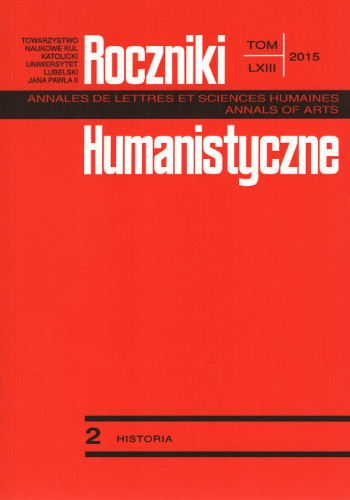Kwestia włościańska w listach pasterskich i kazaniach w Księstwie Warszawskim
The peasant issue in pastoral letters and in homilies in the Duchy of Warsaw
Author(s): Ewa M. ZiółekSubject(s): 19th Century
Published by: Towarzystwo Naukowe KUL & Katolicki Uniwersytet Lubelski Jana Pawła II
Keywords: Duchy of Warsaw;peasant issue in Poland;Polish preaching in the 19th century
Summary/Abstract: Article 4 of the Constitution of the Duchy of Warsaw of 1807 abolished serfdom of the peasants and made all layers of the Polish society equal before the law. However, the regulations were so vague that they caused unrest in the country, since a lot of peasants recognized them as equal to abolition of socage and other services to the lord. In turn, among the nobility fears appeared that peasants could flee from their lords and that riots could break out. On 21st December 1807 Frederick Augustus, the Duke of Warsaw, issued a decree that made the regulations in the Constitution more specific. But as soon as about two months later Minister for Interior and Religious Affairs Jan Paweł Łuszczewski called on the bishops in the Duchy to order the clergy to preach the teachings that would calm down peasants. The minister expected the Church to support the authorities with its authority. In response the bishops proclaimed letters to the clergy with recommendations to teach the faithful the proper lessons. The preserved letters, as well as the three sermons concerning the subject that are known today, evidently show that the Church not only instructed the peasants that it was necessary to maintain the peace and meet their obligations to the lord, but first of all criticized the social situation that obtained at that time. It was emphasized that the peasants’ serfdom could not be reconciled with the Church’s teaching and was unjust. The preachers: Rev. Teodor Mietelski, Rev. Karol Arendt and Rev. Jan Paweł Woronicz decided that the nobility had to accept the new regulations by law, because it was only recognizing the personal freedom of all citizens and their equality before the law that could restore the civilized shape of the social relations in the Polish territories, and was a guarantee of restoring complete independence by the Republic of Poland.
Journal: Roczniki Humanistyczne
- Issue Year: 63/2015
- Issue No: 02
- Page Range: 137-152
- Page Count: 16
- Language: Polish

